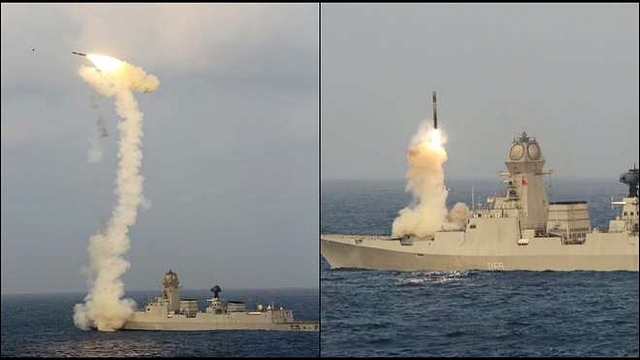
L&T: How A M Naik’s Leadership Transformed L&T Into A Defence Major
The new biography of L&T chairman A M Naik traces the multi-national conglomerate’s role in indigenous defence production and talks about a future that could be compelling.
Defence occupies the gravitational centre of Larsen and Toubro’s past, present and future. The company has been involved with India’s nuclear-powered submarine programme for decades. But it’s the future that could be compelling. Jayant D Patil heads L&T’s defence and aerospace business. On 29 May 2017, Patil was elevated to the board of directors of L&T as wholetime director and senior executive vice-president – defence business. The induction signalled the company’s increased engagement in defence-related businesses and reflected the importance that the sector plays in L&T’s strategic plans. Speaking to the media about the appointment, L&T chairman A M Naik had said: “L&T is well positioned to capitalise on the government’s plan to increasingly indigenise defence production, and we are confident that under the leadership of Mr Patil, L&T will be able to grow its defence business substantially.”
A top-ranker MTech in mechanical engineering from IIT Bombay, Patil is a gregarious man who exudes confidence and bonhomie. In May 2017, L&T received an order from the Ministry of Defence (MoD) for 100 high-tech howitzers, valued at over Rs 4,366 crore. The howitzers will be mounted and integrated into a tank. “They can move at 72 km per hour, they can also go on sand,” says Patil. “Their shelling range is 43 km.”
The 100 self-propelled, tracked K-9 Vajra T-howitzers, to be made by L&T in collaboration with its South Korean partner, Hanwha Techwin, will be delivered in 42 months, Patil confirms. They are likely to be deployed on the Line of Control with Pakistan. Because of their range, firepower, accuracy and mobility, they could prove a game changer as India battles infiltration and terrorism on the border. The guns will be manufactured in a new factory at the Hazira complex, says Patil.
He is full of praise for the former defence minister, Manohar Parrikar. “Mr Parrikar, being a top-class engineer himself, could get into the basics of defence equipment and question people,” says Patil. Patil joined L&T in 1978. Like other old-timers, he lauds the vision and direction Naik has given L&T. He laments, though, that India’s entire defence sector is PSU-driven. “Rs 60,000 crore of defence equipment is ordered from PSUs every year," he says. “Of this Rs 60,000 crore, Rs 30,000 crore is imported by the PSUs. Overall, 65 per cent of our arms are imported. We are the second largest importer of weapons in the world. We used to be the largest, but right now it’s Saudi Arabia. In 2006, we were only the sixth largest arms importer and China was the largest. By 2012, during the former defence minister A K Antony’s time, we swapped positions with China and began importing more and more. When this government came in 2014, things started changing.”
The government’s Strategic Partnership (SP) policy is a significant boost for the ‘Make in India’ initiative in the defence sector, says Patil. “It will provide opportunities valued at about Rs 2 lakh crore in defence manufacturing over the next 10 years to L& T,” he reckons. India’s defence budget (2017-18) is Rs 2.74 lakh crore (excluding Rs 85,740 crore for defence pensions). India is now the world’s fifth largest military spender (after the United States, China, Russia and Saudi Arabia), with a capital spend of Rs 13 to 14 lakh crore likely over the decade. It is expected to order Rs 6 to 7 lakh crore worth of military equipment in domains in which L& T will operate over the next decade. Much of it will be sourced domestically as part of the government’s Make in India thrust. L&T aims to garner a significant share of this business.
Patil’s bullishness was evident even last year, when he declared: “We have a Rs 1.5 lakh crore opportunity in defence within the next four to five years. This is in the naval sector where submarines and ships are to be ordered by 2020. The opportunity in weapon systems, where we already produce airframes, launchers, fire controls and sensors and deliver to the armed forces, is also very large. We are looking at a Rs 85,000 crore market.”
He added that the company delivers major components and systems for the Akash surface-to-air missile system, the BrahMos land attack and anti-ship missile system, as well as upgrades of Russian BM 21 Grad BM21 rocket launchers and Pinaka systems. India’s defence equipment manufacturing potential could finally justify Naik’s prescient investment in Hazira, Talegaon, Coimbatore and Kattupalli.
Consider India’s long-term military requirements
- 1,000 helicopters, valued at $16 billion over the next 10 years;
- 2,000 armoured combat vehicles worth $10 billion to replace the old T-72 battle tanks;
- 100 single-engined multi-role fighter jets for $10 billion;
- Six conventional submarines, valued at $ 8 billion.
Add nuclear-powered submarines, howitzers, guns, air defence systems and warships, and the potential is clearly vast. Patil is optimistic that the defence order pipeline will become robust and start flowing more quickly in the next fiscal. “Mr Naik has the unique ability to negotiate without breaking negotiations,” says Patil.
“It is easy to break down a dialogue. He will not let anything get completely cut off or broken. He is absolutely fearless and blunt. He is very supportive too. He has been my mentor. He has a unique insight on what to focus on and what not to and possesses clear long-term vision.”
Excerpted with permissions from HarperCollins India from the book The Nationalist: How A.M. Naik Overcame Great Odds to Transform Larsen &Toubro into a Global Powerhouse